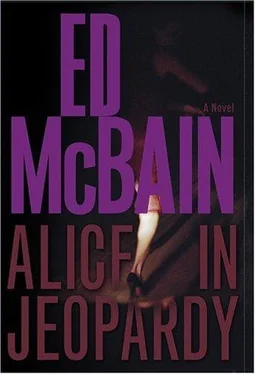“I’ll take it,” Christine says.
“It also comes in a thirty-six-inch version, on sale for $2,300,” the salesman says.
“No, I’ll take the thirty-two-inch,” Christine says.
She digs into her handbag.
She guesses he thinks she’s searching for a checkbook or a credit card. Instead, she comes up with a wad of hundred-dollar bills, and begins counting out $1,900.
“Will that be enough to cover the tax?” she asks.
“Florida sales tax is six percent,” he says. “That comes to a hundred and eight dollars. I’d need another eight dollars from you.”
She fishes a five and three singles from her wallet.
“I’ll write this up and be back in a minute,” he says, and walks to a door on the far wall, and enters what she assumes is someone’s office, possibly a manager’s. She waits with her heart in her throat. Are they checking the bills on a machine similar to the one the bank had? Will they discover the bills are counterfeit? Are they on the phone to the police this very moment?
She waits.
At last, the door opens, and the salesman comes out smiling.
“Here’s your receipt,” he says. “Someone’s bringing a fresh set down now. Will you need help carrying it out to your car?”
“What can I do for you, Mr. Garcia?” Sloate asks.
They are in his third-floor office.
A red baseball cap sits on his desktop.
“Are you the man handling the kidnapping?” Garcia asks.
“What kidnapping is that?” Sloate asks.
Garcia knows at once that he is lying. Anglos lie to him a lot. That’s because he looks like a Cuban. He has a dark complexion and straight black hair and the rednecks down here think of him as a Cuban-American even though he was born in this country, in this state, in fact. Which in his view makes him an American, right? An American who votes here, by the way, but not for Mr. Bush, thank you, and fuck little Elian Gonzalez, too. It’s Garcia’s parents who are so-called Cuban-Americans, which means they immigrated here from Cuba and became American citizens who also voted, but their votes for Bush outnumbered his vote for Gore by two to one, and besides the Supreme Court had the final say.
Sloate is lying to him, he knows that.
“The Glendenning children,” he says. “The little boy and girl who were snatched from school on Wednesday.”
“I’m sorry, I’m not familiar with that case,” Sloate says.
“Then why’d you tell downstairs to send me up?”
“Courtesy to the press,” Sloate says, and shrugs.
“Why are you stonewalling this?” Garcia asks.
“Mr. Garcia, I don’t know what you’re talking about. I haven’t heard of any kidnapping here on the Cape for the past three years. If you think you have information…”
“The Glendenning kids have been out of school for the past two days.”
“Maybe they’re home sick.”
“No, I went there, they’re not home sick. The mother refused to let me in. If they were there, she’d’ve let me talk to them. They’ve been kidnapped, Detective Sloate. You know damn well they’ve been kidnapped.”
“Sorry,” Sloate says.
“Here’s what the Trib’ s gonna do,” Garcia says. “We’re gonna run a big picture of Mrs. Rose Garrity on our front page tomorrow morning. She’s the woman who called in to say the Glendenning kids are missing and nobody’s doing anything about it. We’re gonna run her picture big as life, and we’re gonna tell her story. And when we turn inside to page three, we’re gonna see a big picture of the school guard who witnessed those two kids getting into a blue Impala driven by a blonde woman who definitely ain’t Mrs. Edward Glendenning, who isn’t blonde and who doesn’t drive a blue Impala. We’re gonna tell his story, too, his name is Luke Farraday, and we’re gonna tell the people that the police in this town aren’t doing a damn thing to get those two kids back! How does that sound to you, Detective Sloate?”
“You want to help us?” Sloate asks. “Or you want those kids killed?”
Garcia blinks.
“Tell me,” Sloate says. “Which?”
The voice on the phone is a new one to her.
Gravelly and thick, the voice of a habitual unregenerate smoker, it says merely, “Mrs. Glendenning?”
“Yes,” she says, and then at once, “Who’s this, please?”
“My name is Rudy Angelet, I’m an old friend of your late husband.”
Across the room, wearing the earphones, Charlie looks at her, puzzled. Alice returns a puzzled little shrug.
“Yes?” she says.
“I’d like to offer my condolences,” Angelet says.
“Thank you,” she says, and waits.
It has been almost eight months now since anyone has called to offer condolences. That first week, those first two weeks actually, the phone never stopped ringing. Then news of the drowning became ancient history, and even their closest friends stopped calling to say how sorry they were. She has never heard of Rudy Angelet, though, and she wonders why the call at this late date. So she waits. Warily.
She is wary of any voice on the phone, any knock on the door, fearful that anything she says or does might endanger the children.
“Ah, Mrs. Glendenning,” he says, “I’m sorry to bother you about this, I know you’ve been through a lot…”
“Yes, what is it?” she asks.
“…but we’ve waited what we consider a respectable amount of time before contacting you…”
Waited for what? she wonders.
“…and we feel it’s time we now met to discuss this matter of Eddie’s debt.”
“Eddie’s what ?” she says.
“His debt. The money he owes us. Mrs. Glendenning, I don’t think we should discuss this further on the—”
“I don’t know anything about—”
“—telephone. Perhaps we can meet someplace for a cup of coffee…”
“I don’t even know you,” she says.
“My name is Rudy Angelet,” he says. “And your husband owes us two hundred thousand dollars. Do you know the—?”
“He what ?”
“He owes us two hundred thousand dollars, Mrs. Glendenning. Do you know the diner on 41 and Randall? It’s right on the corner there. The southwest corner…”
“Look, who is this?” she says.
“Last time, Mrs. Glendenning,” he says, and the smoke-seared voice is suddenly loaded with menace. “My name is Rudy Angelet, and your husband owes us two hundred thousand dollars. We’ll be at the Okeh Diner on 41 and Randall at eleven o’clock this morning. I suggest you be there, too. We’ll have breakfast together.”
“I’ve already had breakfast,” she says.
“You’ll have it again.”
“Look, mister—”
“Unless you’d like something to happen to your kids,” he says, and hangs up.
“Who was that?” Carol asks.
“Someone who says Eddie owed him two hundred thousand dollars.”
“They always come out of the woodwork,” Charlie says knowingly.
“He threatened the kids.”
“Then call the police,” Carol says.
Alice looks at her.
“Do you see the police here?” she says. “Are the police doing anything?” she says. “The police in this fucking hick town are sitting on their fat asses while my kids—”
“Hey,” Carol says, “hey, come on, sis,” and takes her into her arms.
It is like when they were children together, growing up in Peekskill, and the kids at school taunted her by calling her “Fat Alice” because she was a little overweight. Well, a lot overweight. But maybe she ate a lot because their father beat her with his goddamn razor strop all the time, the son of a bitch. Carol could never understand why he picked on Alice and exempted Carol herself from punishment. Nothing Alice did ever seemed to please him. Carol could only figure that he resented her being born at all. Or maybe…
Читать дальше












